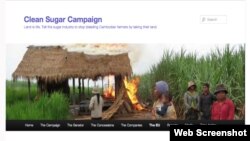Families who have been forcibly evicted from sugar plantation operations in Kampong Speu province, or face the threat of being so, say they have received little help, despite media attention and admonishments from the international community.
Some 1,000 people have lost their land to the development of the plantations since 2010. In interviews, many members of these communities say they will continue to protest and fight against the evictions, in hopes of eventual change.
The plantations are owned by powerful tycoon Ly Yong Phat and are located in Tbpong and Oral districts, spread across 23,000 hectares granted via economic concession in 2010. Such operations are said to produce “blood sugar,” for their effects on local communities, including violent forced evictions and other human rights abuses.
Cheng Sopheap, a representative of the Oral communities, says he is negotiating with the company for compensation, but he will not settle for an unfair price. “Because the company has violated my land, and I will not have fear,” he said. “I’ve decided to die. I farm every day, though some people they fear. They dare not go to farm; the company has taken it all, and the company has started planting sugarcane over people’s land. So there is a small group that owns the land and is farming in the company areas.”
They do this, he said, because though they want development, they also want their lands unaffected. Many have protested, and many have voted against the ruling Cambodian People’s Party as a result of the evictions, he said. “Behold, so far 90 seats have dropped down to 60 seats,” he said, referring to the CPP’s decline in the National Assembly after the 2013 elections. “That’s because of whom?”
Companies have ignored Prime Minister Hun Sen over land deals, he said.
Chan Sokhoeun, from Tbpong, said people there are continuing the fight against the evictions, without fear of intimidation and threats. For the last four years, they’ve seen a poor standard of living, and they see no other solutions, he said. “People are increasingly suffering, and when they can’t work, they just waiting for their death,” he said. “That’s the point, as we practically see it.”
Ly Yong Phat and his representatives could not be reached for comment.
Eang Vuthy, executive director for Equitable Cambodia, which advocates for housing rights, said the companies, government and victims need to work out a solution, perhaps via a public forum.
However, similar efforts last February failed, he said. “What we regret is that there is no solution up to today,” he said. “The issues people raised also have not been resolved in a transparent or fair manner.”
Not only the company, but ANZ bank, which provided them loans, should be responsible to the people, he said. “What the people cannot accept is that the bank is trying to escape from its obligations, because its policy requires the bank to study and evaluate damage, as well as risks, that can occur, before the bank gives loans or invests with any company.”
The companies, meanwhile, has profited from the people’s land “and from land grabs, as well as destroying the natural resources,” he said. ANZ has an obligation to help resolve the problem for the people and pay for damages, he said. “If they want their reputation and popularity, the bank has to realize this, because the profits are coming from the people’s sweat and blood.”
Disaffected families have not only protested outside the bank’s Phnom Penh offices, but they are seeking help from the National Assembly.
Eng Chhay Eang, head of the Assembly’s human rights committee, said they have received the complaints of the people and will investigate. But the committee is currently reviewing at least 10 cases before it can address this one, he said.







